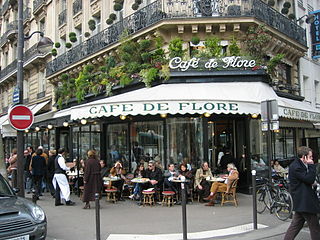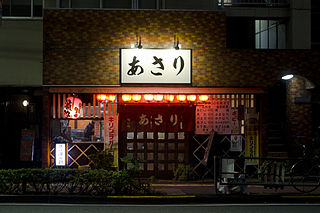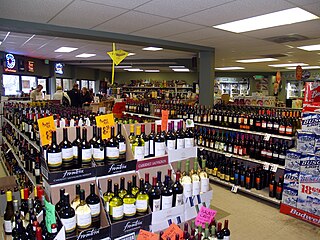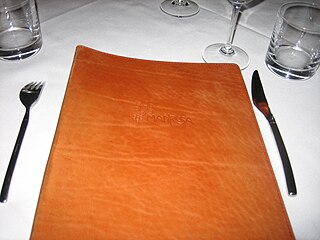
A restaurant is a business that prepares and serves food and drinks to customers. Meals are generally served and eaten on the premises, but many restaurants also offer take-out and food delivery services. Restaurants vary greatly in appearance and offerings, including a wide variety of cuisines and service models ranging from inexpensive fast-food restaurants and cafeterias to mid-priced family restaurants, to high-priced luxury establishments.

A convenience store, bodega, convenience shop, corner store or corner shop is a small retail store that stocks a range of everyday items such as coffee, groceries, fruits, vegetables, snacks, confectionery, soft drinks, ice creams, tobacco products, lottery tickets, over-the-counter drugs, toiletries, newspapers and magazines. In some jurisdictions, convenience stores are licensed to sell alcoholic drinks, although many jurisdictions limit such beverages to those with relatively low alcohol content, like beer and wine. The stores may also offer money order and wire transfer services, along with the use of a fax machine or photocopier for a small per-copy cost. Some also sell tickets or recharge smart cards, e.g. OPUS cards in Montreal or include a small deli. They differ from general stores and village shops in that they are not in a rural location and are used as a convenient supplement to larger stores.

A grocery store (AE), grocery shop (BE) or simply grocery is a foodservice retail store that primarily retails a general range of food products, which may be fresh or packaged. In everyday U.S. usage, however, "grocery store" is a synonym for supermarket, and is not used to refer to other types of stores that sell groceries. In the UK, shops that sell food are distinguished as grocers or grocery shops.

A tavern is a type of business where people gather to drink alcoholic beverages and be served food such as different types of roast meats and cheese, and where travelers would receive lodging. An inn is a tavern that has a license to put up guests as lodgers. The word derives from the Latin taberna whose original meaning was a shed, workshop, stall, or pub.

A bar, also known as a saloon, a tavern or tippling house, or sometimes as a pub or club, is a retail business establishment that serves alcoholic beverages, such as beer, wine, liquor, cocktails, and other beverages such as mineral water and soft drinks. Bars often also sell snack foods, such as crisps or peanuts, for consumption on their premises. Some types of bars, such as pubs, may also serve food from a restaurant menu. The term "bar" refers to the countertop where drinks are prepared and served, and by extension to the overall premises.

A coffeehouse, coffee shop, or café is an establishment that primarily serves various types of coffee, espresso, latte, and cappuccino. Some coffeehouses may serve cold drinks, such as iced coffee and iced tea, as well as other non-caffeinated beverages. A coffeehouse may also serve food, such as light snacks, sandwiches, muffins, fruit, or pastries. In continental Europe, some cafés also serve alcoholic beverages. Coffeehouses range from owner-operated small businesses to large multinational corporations. Some coffeehouse chains operate on a franchise business model, with numerous branches across various countries around the world.

An izakaya is a type of informal Japanese bar that serves alcoholic drinks and snacks. Izakaya are casual places for after-work drinking, similar to a pub, a Spanish tapas bar, or an American saloon or tavern.

A liquor store is a retail business that predominantly sells prepackaged liquors, wine or beer, usually intended to be consumed off the store's premises. Depending on region and local idiom, they may also be called an off-licence, off-sale, bottle shop, bottle store or, colloquially, bottle-o, liquor store or other similar terms. A very limited number of jurisdictions have an alcohol monopoly. In US states that are alcoholic beverage control (ABC) states, the term ABC store may be used.

A warung is a type of small family-owned business — a small retail, eatery or café — in Indonesia. A warung is an essential part of daily life in Indonesia. In the passage of time, the term warung has slightly shifted — especially among foreign visitors, expatriates, and people abroad — to refer more specifically to a modest Indonesian eatery or a place that sells Indonesian retail things. But for the majority of Indonesians, the meaning is still a small, neighborhood convenience shop, often a front room in a family's home.
The Washington State Liquor and Cannabis Board, formerly the Washington State Liquor Control Board, is an administrative agency of the State of Washington. The Liquor and Cannabis Board is part of the executive branch and reports to the Governor. The board's primary function is the licensing of on and off premises establishments which sell any type of alcohol, and the enforcement and education of the state's alcohol, tobacco, and cannabis laws.

A liquor license is a governmentally issued permit to sell, manufacture, store, or otherwise use alcoholic beverages.
Restaurants fall into several industry classifications, based upon menu style, preparation methods and pricing, as well as the means by which the food is served to the customer. This article mainly describes the situation in the US, while categorisation differs widely around the world.

Enoteca is an Italian word that is derived from the Greek word Οινοθήκη, which literally means "wine repository", but it is used to describe a special type of local or regional wine shop that originated in Italy. The concept of an enoteca has also spread to some other countries.

The alcohol laws of Pennsylvania contain many peculiarities not found in other states, and are considered some of the strictest regulations in the United States.

A drinking establishment is a business whose primary function is the serving of alcoholic beverages for consumption on the premises. Some establishments may also serve food, or have entertainment, but their main purpose is to serve alcoholic beverages. There are different types of drinking establishment ranging from seedy bars or nightclubs, sometimes termed "dive bars", to 5,000 seat beer halls and elegant places of entertainment for the elite. A public house, informally known as a "pub", is an establishment licensed to serve alcoholic drinks for consumption on the premises in countries and regions of British influence. Although the terms are increasingly used to refer to the same thing, there is a difference between pubs, bars, inns, taverns and lounges where alcohol is served commercially. A tavern or pot-house is, loosely, a place of business where people gather to drink alcoholic beverages and, more than likely, also be served food, though not licensed to put up guests. The word derives from the Latin taberna and the Greek ταβέρνα/taverna.

A wine list is a menu of wine selections for purchase, typically in a restaurant setting. A restaurant may include a list of available wines on its main menu, but usually provides a separate menu just for wines. Wine lists in the form of tasting menus and wines for purchase are also offered by wineries and wine stores.
Food or drink competitions reward products primarily for their "gustative worth" in the form of an award or a medal. These competitions can be classified into different categories, and most awards are product-specific, such as for wines, beers, and cheeses. Others focus on local, regional and/or national products. Finally, the international competitions test all kinds of foods and drinks available to consumers on a retail basis. Wine is probably the most tested drink, followed by beer and spirits.

Alcohol laws are laws relating to manufacture, use, being under the influence of and sale of alcohol or alcoholic beverages. Common alcoholic beverages include beer, wine, (hard) cider, and distilled spirits. Definition of alcoholic beverage varies internationally, e.g., the United States defines an alcoholic beverage as "any beverage in liquid form which contains not less than one-half of one percent of alcohol by volume". Alcohol laws can restrict those who can produce alcohol, those who can buy it, when one can buy it, labelling and advertising, the types of alcoholic beverage that can be sold, where one can consume it, what activities are prohibited while intoxicated, and where one can buy it. In some cases, laws have even prohibited the use and sale of alcohol entirely.
A beurgeois is a middle-class Muslim born in a working-class area of France to parents of Maghrebi origin, who continues to proclaim their roots and who is aged between 30 and 40 years old with a successful professional career, a high purchasing power and a demand for a certain quality of life.

Ordinaire is a wine bar, wine shop, and bistro-style restaurant in Oakland, California. Located on Grand Avenue in the Grand Lake District, Ordinaire had its grand opening in September 2013. Ordinaire only sells natural wine, produced from organic grapes with minimal chemical and technological intervention. Owner Bradford Taylor opened Ordinaire while pursuing a Ph.D at the University of California, Berkeley with a dissertation on the sense of taste in early 20th century modernist literature. Taylor is also an organizer of an annual natural wine festival in Oakland called Brumaire, which has held events at Ordinaire.


















